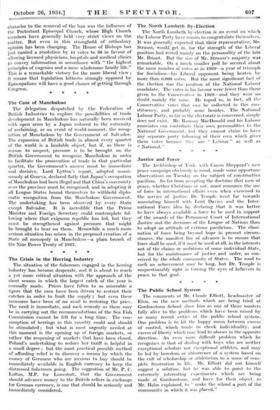The Case of Manchukuo The delegation despatched by the Federation
of 'British Industries to explore the possibilities of trade development in Manchukuo has naturally been received with open arms by a Japan reduced to the extremity of acclaiming, as an event of world-moment, the recog- nition of Manchukuo by the Government of Salvador. The expansion of British trade in almoSt every quarter of the world is a laudable object, but if, as there is reason to suspect, pressure is to be brought on the British Government to recognize Manchukuo in order to facilitate the prosecution of trade in that particular quarter, the Government's answer must be immediate and decisive. Lord Lytton's report, adopted unani- mously at Geneva, declared flatly that Japan's occupation of Manchukuo had been illegal and that China's suzerainty over the province must be recognized, and in adopting it all League States bound themselves to withhold diplo- matic recognition from the Manchukuo Government. The undertaking has been observed by every State except Salvador. It is incredible that the Prime Minister and Foreign Secretary could contemplate fol- lowing where that exiguous republic has led, but they must be strengthened against pressure that might be brought to bear on them. Meanwhile a much more serious situation has arisen in the proposed creation of a State oil monopoly in Manchukuo—a plain breach of the Nine Power Treaty of 1922.






















































 Previous page
Previous page